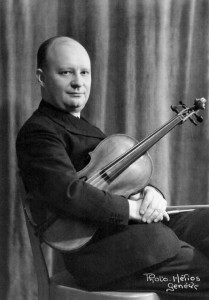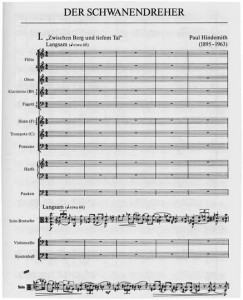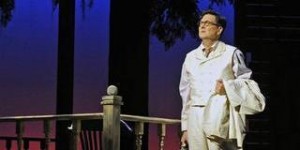 “A man who would tell me that I am pretty, unless he is over seventy, ought to be kicked out of the room. But a man who can’t show me that he thinks me so without saying a word about it, is a lout.”
“A man who would tell me that I am pretty, unless he is over seventy, ought to be kicked out of the room. But a man who can’t show me that he thinks me so without saying a word about it, is a lout.”
Anthony Trollope, Phineas Finn
Terry Teachout on the arts in New York City
I’ve always had a special love for recordings of important classical pieces that were made by their composers. A great many classical composers of significance have made recordings, and four of them, Leonard Bernstein, Benjamin Britten, Sergei Rachmaninoff, and Richard Strauss, were world-class performers who would likely have become famous had they never written a note. Quite a few others—Barber, Bartók, Debussy, Elgar, Poulenc, Prokofiev, Saint-Saëns, and Shostakovich come immediately to mind—also made accomplished recordings, usually but not always of their own music.
On the other hand, some of the best-known composer-performers, judging by their records, left a certain amount to be desired in the technique department. Aaron Copland and Igor Stravinsky, for instance, were excellent pianists but fair-to-middling conductors whose recordings, interesting though they always are, cannot necessarily be taken at face value as representative documents of their interpretative intentions.
Stravinsky’s conducting, both on and off record, was the source of much controversy during his lifetime, and qualified observers of his live performances not infrequently spoke scathingly of them. Paul Hindemith, who heard Stravinsky conduct three of his ballets in New York in 1935, described the results bluntly in a letter to his wife:
It began with Apollo, the music of which struck me today as very corpse-like; this must surely have been because the good Igor is a truly mediocre conductor and cunningly avoids any step in the direction of free and spontaneous music making.
 I quote from this letter because it was written around the time that Hindemith, who was also a violist, recorded his own Der Schwanendreher with a chamber orchestra led by none other than Arthur Fiedler, the Boston Pops man. In his youth Hindemith won high praise for his playing, but he didn’t practice much (if at all) after he became a famous composer, and by 1929, when he gave the premiere of William Walton’s Viola Concerto in London, his playing, as Walton remembered it, wasn’t exactly what you’d expect from a virtuoso: “His technique was marvelous, but he was rough—no nonsense about it. He just stood up and played.”
I quote from this letter because it was written around the time that Hindemith, who was also a violist, recorded his own Der Schwanendreher with a chamber orchestra led by none other than Arthur Fiedler, the Boston Pops man. In his youth Hindemith won high praise for his playing, but he didn’t practice much (if at all) after he became a famous composer, and by 1929, when he gave the premiere of William Walton’s Viola Concerto in London, his playing, as Walton remembered it, wasn’t exactly what you’d expect from a virtuoso: “His technique was marvelous, but he was rough—no nonsense about it. He just stood up and played.”
Hindemith’s recording of Der Schwanendreher, made in Boston in 1935, leaves no doubt of the continuing decline in his playing. His technique is infirm, his intonation slightly but perceptibly erratic. When he played the same piece four years later with the San Francisco Symphony, Alfred Frankenstein made no secret of his displeasure:
To be perfectly frank, another thing that did not live up to specifications was Hindemith’s viola playing. His records are magnificent, but yesterday afternoon the tone seemed somewhat wiry and strained and devoid of the mellow quality, characteristic of the instrument.
Small wonder that Hindemith ceased shortly thereafter to appear in public as a soloist.
 Why, then, would anyone want to listen to Hindemith’s recording of Der Schwanendreher? One reason, of course, is that any recording by a major composer is worth hearing. Assuming that he himself found it satisfactory—and we know from his letters that he enjoyed working with Fiedler—it tells us by definition something of interest about his interpretative intentions. But I hear something else in this 1935 recording. To me it is…well, a relic, in the specifically religious sense of the word.
Why, then, would anyone want to listen to Hindemith’s recording of Der Schwanendreher? One reason, of course, is that any recording by a major composer is worth hearing. Assuming that he himself found it satisfactory—and we know from his letters that he enjoyed working with Fiedler—it tells us by definition something of interest about his interpretative intentions. But I hear something else in this 1935 recording. To me it is…well, a relic, in the specifically religious sense of the word.
Pretty much everyone now agrees that Hindemith was at the very least an important composer, and I happen to think he was a great one. In 2002 I called him “the last German master of music,” uneven but true, who at his not-infrequent best was capable of turning out “pieces of extreme beauty.” The slow movement of Der Schwanendreher, which is based on two German folksongs, is one of those pieces, and Hindemith wrote it at a time when it was becoming evident to him that the German musical culture in which he was so deeply rooted was being poisoned by Nazism. He emigrated three years after recording Der Schwanendreher, setting up shop as a professor of music at Yale and, in due course, becoming an American citizen.
While we cannot know what was going through Hindemith’s mind when he recorded this piece, I like to think that he was remembering the soon-to-be-lost world of his youth, and that his playing—a bit scratchy, a bit shaky, but audibly heartfelt—was a requiem of sorts for what he was in the process of losing. I can’t believe that it was a coincidence that the first of the two folksongs on which this movement is based is a song of sorrow: Shed your leaves, little linden tree,/I can bear it no longer:/I have lost my love,/And today is mournful.
So hear, if you will, the melancholy sound of a middle-aged viola player whose technique had gone to seed. That is your privilege, but I hear something else, something infinitely precious, something that brings middle-aged tears to my eyes each time I listen.
* * *
Paul Hindemith plays the second movement of Der Schwanendreher in 1935, accompanied by Arthur Fiedler’s Sinfonietta:
I’m a dyed-in-the-wool aesthete who would dearly love to live in an exceptionally beautiful house and would willingly put up with a significant amount of nuisance value (i.e., leaky roofs) in order to do so…but not an unlimited amount. To put it as drastically as possible, I wouldn’t want to live in Fallingwater if it didn’t have indoor plumbing—and I might well think twice about it if there wasn’t a good place to hang my John Marin etching, either….
Read the whole thing here.
 Mrs. T and I left for Florida on December 28 and returned to Manhattan yesterday afternoon. We took an Amtrak sleeper car both ways, and the overnight trip home was as crowded and uncomfortable as its predecessor. Now that I’ve experienced two twenty-four-hour-long journeys in a Viewliner Standard Roomette that was theoretically built for two, I’m less than eager to do it all over again any time soon. Closets were made for storing clothes, not human beings, even those whom apartment life in New York City has long since accustomed to unnaturally close quarters.
Mrs. T and I left for Florida on December 28 and returned to Manhattan yesterday afternoon. We took an Amtrak sleeper car both ways, and the overnight trip home was as crowded and uncomfortable as its predecessor. Now that I’ve experienced two twenty-four-hour-long journeys in a Viewliner Standard Roomette that was theoretically built for two, I’m less than eager to do it all over again any time soon. Closets were made for storing clothes, not human beings, even those whom apartment life in New York City has long since accustomed to unnaturally close quarters.
Still, our voyage was tolerable and not without its modest pleasures. Since Amtrak’s Silver Meteor, incredibly and archaically enough, has no wi-fi service, I spent much of my enforced leisure time on board reading Herman Wouk’s The Caine Mutiny (about which more another day) and most of the rest of it looking out the window of our compartment as America passed me by, unrolling itself in a tranquilizingly continuous stream of uneventful eventfulness. That’s the best part of train travel, and for me it never palls.
 Duke Ellington was another devoted train traveler, and I wrote about why he liked it so much in Duke:
Duke Ellington was another devoted train traveler, and I wrote about why he liked it so much in Duke:
In addition to setting him apart from his sidemen—he slept not in a berth but a roomette—it provided him with “mental isolation…Folks can’t rush you until you get off.” For a touring bandleader whose occupation forced him to compose on the road, such privacy was a must. Ruth Ellington remembered seeing her brother “in a [railroad] siding somewhere in Texas, the heat at 110, the sweat pouring off him on to a piece of manuscript paper on his knee, catching up on something he wanted to finish.” Moreover, he loved the ever-changing sounds of train travel, above all the train whistles: “Especially in the South. There the firemen play blues on the engine whistle—big, smeary things like a goddam woman singing in the night.”
It was natural for such homely sounds to find their way into his work, most famously in “Daybreak Express,” a jazz counterpart of Arthur Honegger’s Pacific 231 that the Ellington band recorded in 1933, ten years after the Swiss composer produced his own exercise in musical onomatopoeia. Like Pacific 231, “Daybreak Express” is an orchestral tour de force that reproduces the sounds of high-speed train travel with uncanny, almost eerie accuracy. Barney Bigard marveled at the way in which Ellington was able to “take an ordinary situation and put it into some music…We’d all be up at night gambling and we’d hear the whistle blow as we went over a crossing. Duke would hear all the same things. The only difference was, we were playing poker and he was writing music about that whistling.” He would do so on many other occasions. Two years later, for instance, he wrote Reminiscing in Tempo, whose rock-steady rhythmic patterns, he explained, were “all caught up in the rhythm and motion of the train dashing through the South.”
I wish I could say that Amtrak had done as well by me, but I didn’t write anything like a miniature masterpiece during either of our long train trips. I did, however, knock out a dozen-odd columns and essays while we were in Florida, several of them about the plays and musicals that I saw there, the seeing of which was the point of the exercise. I also saw several gorgeous sunsets, all of them on Sanibel Island, and rejoiced, as I always do, in the company of my beloved and indispensable Mrs. T. We are never more continuously together than when we are in Florida, and we never fail to enjoy our togetherness.
 I flew back to New York two times to review shows and tried to do so twice more, stymied in both cases by the horrific winter weather that has been pulverizing so much of the country this year. I wasn’t sorry to escape most of it, and I already feel nostalgic for the warmth of Florida, as well as the treasured friends that we’ve made there in recent years. It somehow seems fitting that it started to snow—hard—less than an hour after we got back to our Manhattan apartment.
I flew back to New York two times to review shows and tried to do so twice more, stymied in both cases by the horrific winter weather that has been pulverizing so much of the country this year. I wasn’t sorry to escape most of it, and I already feel nostalgic for the warmth of Florida, as well as the treasured friends that we’ve made there in recent years. It somehow seems fitting that it started to snow—hard—less than an hour after we got back to our Manhattan apartment.
On the other hand, our stay in Florida was in certain ways unusually stressful, for Mrs. T experienced some health problems late in January that forced her to spend a few days in a Sarasota hospital. It’s no fun recuperating in anonymous hotel rooms, even in Florida, for which reason we’re gladder than usual to be home again, free of the nagging burden of sleeping in strange beds and living out of suitcases.
All that said, we’ll both miss the Sunshine State, and it pleases me greatly to know, as I announced in this space three weeks ago, that I’ll be going back there in May of 2016 when Palm Beach Dramaworks mounts Satchmo at the Waldorf, my first play. It happens that I’ve never been in Florida when it’s hot, and I suspect that it will be interesting (to put it delicately) to see what I make of the much-altered climate.
In any case, Mrs. T and I are done with Florida for the time being, and I’ve already jumped back onto the conveyor belt of my everyday life: I’m seeing four shows on and off Broadway this week, and I’ll be pulling on my winter coat to see all four of them. That’s my life, and I wouldn’t do it if I didn’t love it—but I can’t deny that a not-so-small part of me remains down south, sitting by the Gulf of Mexico, listening to the surf crash endlessly on the beach, and thinking about nothing in particular. That’s my life, too.
* * *
Daybreak Express, a 1953 film by D.A. Pennebaker about train travel in New York. The musical score is Duke Ellington’s composition of the same name, recorded by his band in 1934:
 A very rare kinescope of the Sauter-Finegan Orchestra playing “Midnight Sleighride” on TV in 1954. The piece is a jazz arrangement by Bill Finegan of the “Troika” from Prokofiev’s Lieutenant Kijé:
A very rare kinescope of the Sauter-Finegan Orchestra playing “Midnight Sleighride” on TV in 1954. The piece is a jazz arrangement by Bill Finegan of the “Troika” from Prokofiev’s Lieutenant Kijé:
(This is the latest in a series of arts-related videos that appear in this space each Monday and Wednesday.)
In today’s Wall Street Journal I report from Florida on two very impressive Orlando Shakespeare Theatre productions, To Kill a Mockingbird and Henry V. Here’s an excerpt.
* * *
Now that Harper Lee is back in the news, it’s likely that Christopher Sergel’s workmanlike 1990 stage version of “To Kill a Mockingbird,” which was already a staple of regional theaters throughout America, will be mounted even more frequently than it was in the past quarter-century. Not being a fan of theatrical adaptations of popular novels, I’d hitherto steered clear of it, but the controversy over the discovery of “Go Set a Watchman,” the first draft of “Mockingbird,” made me curious. How would so familiar a book, especially one that was made into an equally well-known film, go over on stage? And when I heard that it was being performed by Florida’s Orlando Shakespeare Theatre, I was even more curious to know how “Mockingbird” would be received in a state where 331 lynchings took place between 1877 and 1950. So I went to see for myself—and was mightily impressed….
 The secret ingredient in Orlando Shakespeare’s recipe is the staging of Thomas Ouellette, which is exceptional in every way. For openers, Mr. Ouellette has made sure that his cast does nothing to remind you of the now-iconic performances seen in Robert Mulligan’s 1962 film version. Instead of “doing” Gregory Peck, Warren Kelley turns Atticus Finch into a geeky, almost comically earnest small-town lawyer who somehow finds within himself the power to rise to the occasion of defending a black man falsely accused of rape—and it works. Kennedy Joy Foristall’s strident, bratty Scout is similarly idiosyncratic, and the other characters are no less sharply drawn. The dramatic tension in each scene is unobtrusively screwed up to the highest possible pitch….
The secret ingredient in Orlando Shakespeare’s recipe is the staging of Thomas Ouellette, which is exceptional in every way. For openers, Mr. Ouellette has made sure that his cast does nothing to remind you of the now-iconic performances seen in Robert Mulligan’s 1962 film version. Instead of “doing” Gregory Peck, Warren Kelley turns Atticus Finch into a geeky, almost comically earnest small-town lawyer who somehow finds within himself the power to rise to the occasion of defending a black man falsely accused of rape—and it works. Kennedy Joy Foristall’s strident, bratty Scout is similarly idiosyncratic, and the other characters are no less sharply drawn. The dramatic tension in each scene is unobtrusively screwed up to the highest possible pitch….
Orlando Shakespeare Theatre is a puzzlement, a first-class drama company whose stature is too often obscured by unadventurous programming. It’s only because I already knew how good Orlando Shakespeare is that I went out of my way to see its production of “To Kill a Mockingbird,” and Jim Helsinger’s “Henry V” poses a like problem: why bother with yet another revival of a classic that gets done so very often? The answer is that this is an extraordinarily fine small-scale production of a supremely great history play, performed on an open stage in a 118-seat theater by six men and two women, all of them outstanding. Everyone in the cast plays double or triple roles, even John P. Keller, who is both grippingly incisive as young Henry and preposterously foppish as the Dauphin. Mr. Helsinger’s staging is propelled by a strong comic energy that is never allowed to undercut the high seriousness of the proceedings….
* * *
To read my complete review of To Kill a Mockingbird, go here.
To read my complete review of Henry V, go here.
| M | T | W | T | F | S | S |
|---|---|---|---|---|---|---|
| 1 | 2 | 3 | 4 | |||
| 5 | 6 | 7 | 8 | 9 | 10 | 11 |
| 12 | 13 | 14 | 15 | 16 | 17 | 18 |
| 19 | 20 | 21 | 22 | 23 | 24 | 25 |
| 26 | 27 | 28 | 29 | 30 | 31 | |
An ArtsJournal Blog